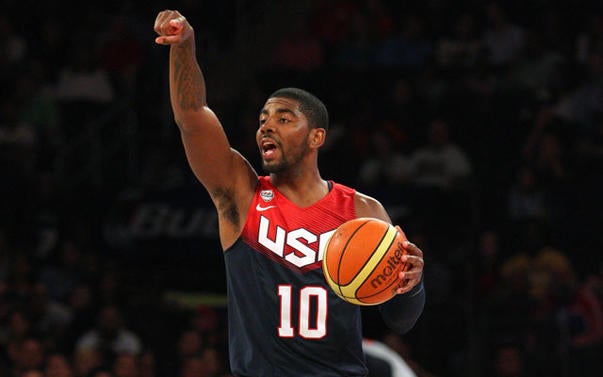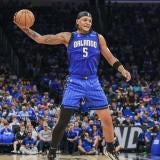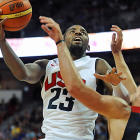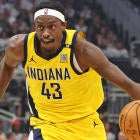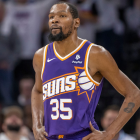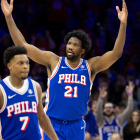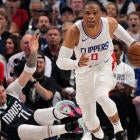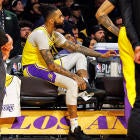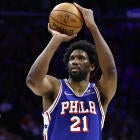The list of elite, young, American-born talent in today's NBA runs as deep as it has at any point in basketball history. With the Rio Olympics due to start in a few weeks, that avalanche of talent could have given USA Basketball its deepest, most versatile and maybe even best roster of all time.
Then, the RSVP: NOPE replies started arriving one after another. LeBron James. Stephen Curry. Russell Westbrook. Kawhi Leonard. James Harden. John Wall. Anthony Davis. Chris Paul. Blake Griffin. All out for one reason or another.
Considering this is what LeBron looked like after finally delivering on his promise of a championship in Cleveland, you could forgive him for wanting a physical, mental and emotional break rather than shipping off to Brazil. The Warriors, too, pushed all the way to Game 7 of the Finals, so you couldn't fault any of their players for begging off, especially not their banged-up and exhausted star Curry.
Players who missed significant time this season with injuries might lean toward not pushing things too hard over the summer, so Paul, Griffin and Davis didn't figure to join.
But as the rejection letters rolled in, the reasons for bowing out looked less and less robust. Westbrook played his usual manic style throughout a long season, one that ended with a grueling Western Conference finals, but LaMarcus Aldridge, Leonard and Damian Lillard all bowed out in the Western Conference semifinals. Harden and Drummond went out in the first round.
You respect players' individual decisions of course, whatever the rationale. They're under no obligation to play for Team USA, and nitpicking the reasons that abstainers give risks applying judgment where none should be applied. Still, by the time Gordon Hayward bowed out due to his wife expecting their second child (as well as concerns over the Zika virus), some skeptics might've begun to wonder: Does anyone still want to represent his country?
Twelve players did, in fact, answer the call. Team USA will carry Kyrie Irving, Kyle Lowry and Klay Thompson at guard; Jimmy Butler, Harrison Barnes and DeMar DeRozan as swingmen; Paul George, Carmelo Anthony, Kevin Durant and Draymond Green at forward; and DeMarcus Cousins and DeAndre Jordan at center.
Not exactly the Dream Team, but certainly not a scrub squad, either. All told, what does this roster mean for Team USA's chances this summer? For the answer, we turned to Synergy Sports Technology (Synergy specializes in basketball analytics, providing on-demand video and data for scouting of NBA games, as well as WNBA, NCAA Division I, and various international leagues).
Digging right into the numbers, without LeBron, Curry and other superstars who can create their own shot and pile up buckets, the data points to different usage patterns of national team players than we're used to seeing in international competition.
"In the past, pretty much everyone played at least 10 minutes a game," said Matt Kamalsky, an analyst for Synergy. "That's when the team had it easy, over the past five or six years. Now we're revisiting some of the old issues, where every 10 years or so we put out a national team that isn't quite as strong as we're accustomed to."
In USA Basketball's four most recent losses in global-level competitions using NBA players (three in the 2004 Olympics, one in the 2006 FIBA World Cup), the Americans shot a combined 22 for 84 (26.2 percent) from 3-point range. That's the kind of dangerous trend the U.S. needs to avoid if it wants to squash upstarts' chances at an upset. It's also why, with a thinner group of scorers at their disposal, Kamalsky said we could see Durant and Thompson in particular logging 30-plus minutes a game.
"This is often the remedy for upset-minded teams in FIBA play," Kamalsky said. Hope that Team USA struggles to score, then have those international rivals "come out unusually hot from the field."
The good news is that the last-minute addition of a post-championship glowing Irving figures to give the team a big boost, Kamalsky said. Irving shot an off-the-charts 61 percent as the fifth-leading scorer for Team USA at the 2014 FIBA World Cup. That's not counting Irving's elite ball-handling skills (a must for a team that has only one other true point guard on the roster), who's also coming off the best stretch of his entire career during the Cavs' run to glory.
Meanwhile, Thompson, surprisingly, was one of Team USA's best players in Spain, shooting 42 percent from 3-point range as the team's second-leading scorer.
Beyond the Irving add, Kamalsky is most optimistic about what the team's top players could do when given reduced workloads. Players like Irving, Anthony and Cousins command the ball so often for their NBA teams, it can sometimes seem like a miracle that they can keep up their energy in the fourth quarter, let alone drill dagger shots in the final minutes.
Given much lighter responsibilities, they've been borderline unstoppable playing overseas. In addition to Irving's furious long-range sniping, Cousins shot close to 70 percent from the field during the 2014 World Cup, annihilating smaller opponents and thriving when playing fewer minutes than he typically does for Sacramento.
And Anthony, in some ways, is on a whole higher level.
"Carmelo may be the best player to play power forward internationally that we've seen," Kamalsky said. "Pretty much every time he plays for USA Basketball, that is his shot, running into short threes in transition, or taking those little stutter-step threes. No matter what he gives you on defense, he can score enough points with that shorter three-point line to make it well worth their while."
Question marks remain. Lowry and DeRozan played poorly for extended stretches during the playoffs, leaving one to wonder how they'll produce in Rio. Draymond Green's Swiss army knife skill set could make him ideal for Olympic competition, though it'll be up to coach Mike Krzyzewski to figure out whether the team should use Green as an Andre Iguodala-style defensive stopper, or give him broader responsibilities. Given how ugly Barnes' shot became as the playoffs wore on for the Warriors, towel-waiver might end up being his best position.
The broader, long-term discussion will thus revolve around whether Jerry Colangelo can wrangle the best players to sign up next time, meaning less pressure on players like Lowry and likely no roster spots at all for players of Barnes' ilk. If history is any indicator, Colangelo should be able to turn the tide post-Rio.
After Team USA's last lull in talent in the early-to-mid 2000s, younger players like James, Anthony and Dwyane Wade teamed up with more established stars like Tim Duncan and Kobe Bryant to reinvigorate the national pride. To be fair, this year offered a tough and unlikely-to-repeat confluence of circumstances, with everything from injuries to the Zika virus dissuading some of the game's brightest stars from joining the team.
Until then, the question at hand is much simpler.
"If we send our B team, can rest of the world beat them?" Kamalsky asked. "Fran Fraschilla, who knows the international game so well, has said that the national teams in the rest of the world aren't as strong as they were when USA Basketball had the problems it did a decade ago, bringing in guys like Michael Finley and Richard Jefferson."
So even with LeBron, Curry and many of their talented friends staying home for the summer, "I'm still not sure it'll come back to bite them."
